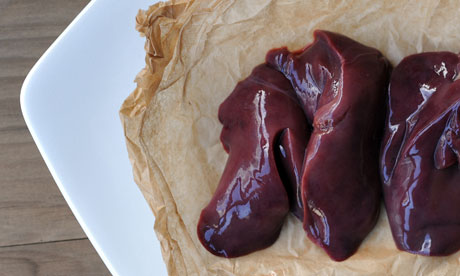
Thanks to the "yuck" reaction that offal provokes, and the tedious predictability of their cooking treatment in the UK – chicken liver pâté anyone? – chicken livers don't top most people's shopping lists. That's a shame, because when nicely cooked (seared on the outside, still rosy within), with their robust, meaty character balanced by another big flavour (think vinegar, pomegranate molasses, bacon, marsala, tart berries), and perhaps freshened up at the last moment with salad leaves and fresh herbs, they make most rewarding eating.
The Food Standards Agency advises caterers that all liver should be thoroughly cooked to kill any bugs that might just be present, which means an unappetising, solid, grey result. You might prefer to buy high-quality, free-range chicken livers, preferably organic, then cook them less.
Why are chicken livers good for me?
Chicken livers are high in protein and a rich store of folate, which is important for fertility and helps prevent certain birth defects. (Food Standards Authority advises pregnant women not to eat liver because too much vitamin A can harm the baby.) Livers are also loaded with iron to give you energy and a treasure trove of certain B vitamins, most notably B12. This nutritional profile makes them a good choice for anyone prone to anaemia. Chicken livers are also one of the top sources of vitamin A, which helps eye health.
Where to buy and what to pay
Supermarkets sell packs of "fresh British" (read "factory farmed") chicken livers for around £2/kg. But because the richness of chicken livers means that just a few will go a long way, you can probably afford to trade up for the best. Expect to pay around £10-12/kg for organic livers, either at the farmer's market or delivered to the door.
• Joanna Blythman is the author of What To Eat (Fourth Estate, £16.99). To order a copy for £11 with free UK p&p, go to guardianbookshop.co.uk
Devilled chicken livers on toast with watercress
Chicken livers are quite rich, so a little devilling is a good approach. This makes a really good lunch or supper dish, or a starter for more people.
Serves 2-4
2 heaped tbsp plain flour
1 tsp English mustard powder
A pinch of cayenne pepper
360g chicken livers, trimmed of any sinew and discolouration
1 tbsp flavourless oil
½ tbsp sherry vinegar
Few splashes Worcestershire sauce
150ml chicken or vegetable stock
30g butter
4 pieces of good bread, eg sourdough
1 bunch watercress, trimmed, washed and dried
Splash of olive oil
½ tbsp capers
A handful of flat-leaf parsley, finely chopped
Salt and pepper
1 Mix the flour, mustard powder, cayenne and salt and pepper. Put into a flat dish and toss the chicken livers in the mixture. Dust off any excess and put them on a plate in one layer.
2 Heat the oil in a large, heavy-based frying pan on a high heat. When it is hot, add the chicken livers. When they are all sizzling nicely, turn the heat down a little – you want enough heat to create a crisp coat but not so much that they char. Turn after 2 minutes and cook the other side for 2 minutes.
3 Lift the livers out on to a warm plate and quickly add to the pan the sherry vinegar and Worcestershire sauce. Let these bubble for a moment, then add the chicken stock and stir to deglaze the pan and capture all the flavours. Once the stock has reduced a little, add the butter and swirl it into the stock.
4 Toast the bread. Dress the cress with the olive oil, seasoning and capers.
5 Return the livers to the pan and let them bubble for a minute. Throw in the parsley and pile the watercress on to the warm toast and spoon the livers and their liquor on top.
• Rosie Sykes is head chef of Fitzbillies (fitzbillies.com) and co-author of The Kitchen Revolution (Ebury Press, £27.50). To order a copy for £19.99 with free UK p&p, go to guardianbookshop.co.uk
• This article was amended on 5 March 2013 to add the information that the Food Standards Authority advises pregnant women not to eat liver.

